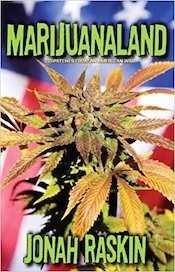“Marijuana seems to interfere with short term memory recall, and there’s evidence that it can interfere with the acquisition of new memory,” Dale Gieringer said. “But it doesn’t effect permanent storage of memory.” The Director of California NORML—the oldest cannabis lobbying organization in the world—Gieringer has accumulated mountains of information about marijuana that go back to the 1960s, when he lived in Cincinnati, Ohio which had, he says, “a mini, mini Haight Ashbury.” Gieringer’s sharpest memories are of the campaigns to decriminalize and legalize marijuana. “I was surprised by how many friends of mine who had been long-time pot smokers suddenly came out of the closet with the passage of Prop 215—the Compassionate Use Act—that legalized medical marijuana twenty-one years ago,” he said. “Suddenly, healthy people had all kinds of health issues. I never regarded myself as a medical marijuana user and I resisted going their way.”
Gieringer worked with Dennis Peron, a Vietnam veteran and gay activist, for the passage of Prop 215, and then felt embarrassed when Peron came out and insisted that all marijuana was medical. “I thought it was unseemly from a PR point of view, though I didn’t think it was immoral,” Gieringer said. “The net result of 215 was positive. It helped reduce arrests and it made many Americans feel comfortable with the sale of pot to adults.”
A Harvard graduate with a Ph.D. from Stanford, Gieringer became the Director of California NORML in 1987 when the future of legal weed looked dark. “I told myself, ‘now’s the time to get involved when the movement is at rock bottom, and then ride  it to the top,’” he explained. For Gieringer, the cause of marijuana has always been about personal freedom and the unconstitutionally of the drug wars. Moreover, northern California was, for him, the place to be. “I feel in love with the wilderness and thought that the CAMP raids with helicopters and troops were desecrating it.”
it to the top,’” he explained. For Gieringer, the cause of marijuana has always been about personal freedom and the unconstitutionally of the drug wars. Moreover, northern California was, for him, the place to be. “I feel in love with the wilderness and thought that the CAMP raids with helicopters and troops were desecrating it.”
The way Gieringer sees it, the tipping point for legalization came about in 2008, right after the election and before Obama moved into the White House. “Under Bush, people thought the cause was hopeless,” Gieringer said. “Then, with Obama’s victory they started to say, ‘we can do it.’ Indeed, we legalized adult use in Colorado, Oregon, Washington, and California. Sometimes you have to wait for the wave to come before you can ride it.”
His pot prognosis was upended when Trump won the 2016 election. “I expected that Hillary would be elected and that her victory at the polls would led to a change in the federal government,” he said. “If someone had said in 1996 that federal law would be the same twenty-one years later I would have been dumb-founded.”
The present isn’t yet past, but Gieringer had a few thoughts about the contemporary events that might make their way into his memory bank. “Sessions isn’t an advance over anything,” he said. “I believe that he’d like a crack down on marijuana and I wouldn’t be surprised if the feds initiate law suits against the industry.” Gieringer added, “They can arrest California growers who are shipping out of state, but thousands of growers are doing that. They can’t stop them all. As I see, it the California cannabis industry will continue full speed ahead in the next year or so, with the black market as strong as ever.”
Gieringer expects to be around for the battles yet to come. “The feds can’t put the pot genie back in the bottle,” he said. “Marijuana use is so wide spread and so widely accepted we can’t go back to the days of reefer madness.”
Jonah Raskin is the author of Marijuanaland: Dispatches from an American War.